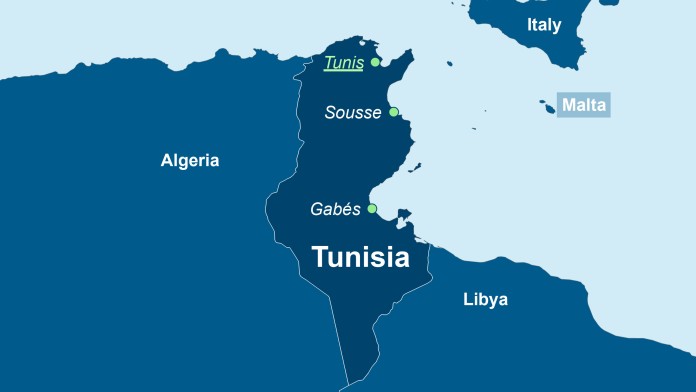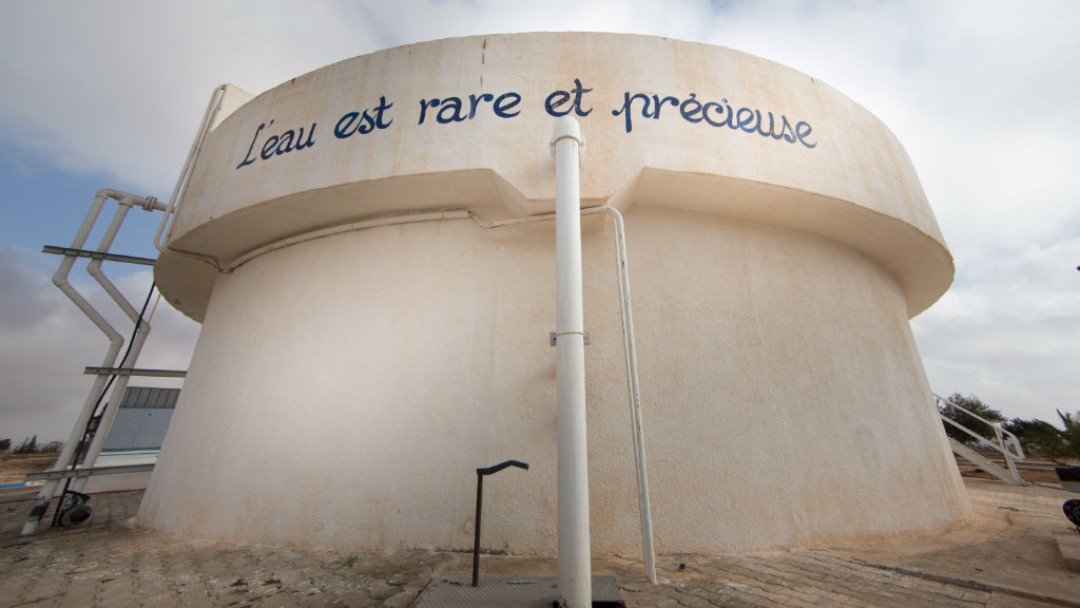
As of: 04/2024
Tunisia is one of the most arid countries in the world. It has hardly rained in the past four years and reservoir reserves have fallen to a low level. At the same time, resources are unevenly distributed between the water-rich north and the dry centre and south. Commissioned by the German Federal Government, KfW is supporting numerous integrated water resource management projects. (IWRM) Several projects aim to divert excess water from the north to the water-poor regions. There are also measures to reduce unaccounted for water, increase storage capacities and preserve water and soil resources. This not only serves as an adjustment to climate change, but also promotes economic development.
Tunisia is suffering from an alarming water shortage. According to calculations, only 420 cubic metres of water per capita are available annually in the country. This makes it one of the countries with the scarcest water availability in the world. The effects of climate change are already clear: over the past four years, it has rained much less than usual. A large part of the wheat harvest has dried out. In addition, reservoir reserves have fallen to close to a third of their capacity.
Yet in the north of the country, sometimes there is actually a surplus of water. Here, the annual precipitation volume is an average of 1,500 mm, while in the south it is only 150 mm. Therefore, it is expedient to channel water from the north to the centre of the country, much of which is covered by smallholder farmsteads.
So far, the resource water has not been managed efficiently enough. Pipe networks are old and dilapidated. As a result, 25% of the mains water seeps out. In some regions, this figure is significantly higher. Water prices do not cover costs in all areas (waste water, drinking water, irrigation). Illegal abstractions and informal wells are widespread. In many places, the ground water table is falling due to overuse, which also means that there is no longer an unlimited reserve supply of ground water for dry years.
On Tunisia’s vast beaches, another problem comes into play: increasing amounts of land are being eroded away. This also has an adverse impact on tourism, one of the most important pillars of the Tunisian economy.

For decades, KfW Development Bank, commissioned by the Federal Ministry for Economic Cooperation and Development (BMZ), has been extensively active in the Tunisian water sector. It is supporting the integrated water resource management programme launched by the Tunisian Government. This includes measures that fall under three pillars:
KfW is making a total of around EUR 1.1 billion available for several projects in the sector. For example, two desalination plants have been financed, providing high-quality drinking water for 1.5 million people in the south of the country. More than 47 sewage treatment plants have been built or rehabilitated. The mains networks in seven provinces with particularly high unaccounted for water rates are being modernised. For example, the Medjerda canal, which supplies drinking water to four million people, has been rehabilitated. The irrigation of agricultural areas has been optimised. With KfW's support, more than 50,000 hectares of irrigation perimeters have been modernised and droplet irrigation systems, which save considerable amounts of water, have been installed.
Action has also been taken in the political sphere. Reform steps were implemented to adjust water and waste water tariffs. Previously, these did not cover costs: there was no incentive for households to use water sparingly. Now, prices have been gradually increased. However, poorer people continue to pay the previous low tariff.
Reservoir dams have been partly raised to increase the reservoir capacity. In addition, a project to transfer water from less dry areas to the centre of the country is in the preparation phase. Water transfer is cheaper than desalination.
On the coast of Tunisia, projects financed by KfW since 2013 have been stabilising the coastline (erosion control), for example through nature-based solutions such as the construction of sand fences and sand fillings or “traditional” coastal protection structures such as wave breakers and groynes. This will preserve the coastal area and beaches as nature and recreational areas for local and international tourism.
The measures will benefit around 4.5 million Tunisians. As a result, living conditions will be improved for almost half of the population. A total of 3.6 million people are benefitting from the rehabilitation and new construction of the 47 sewage treatment plants. Illnesses caused by contaminated water are being significantly reduced. At the same time, improving sewage treatment has a positive impact on the environment and biodiversity. A total of 1.5 million people benefit from the drinking water from the desalination plants in Djerba and Zarat. The water transfer from northern to central Tunisia is set to increase water availability, especially in the rural, disadvantaged areas. Here, water plays an important role in socio-economic development.
The large-scale projects to improve the infrastructure create jobs: a total of 35,000 temporary jobs were created during the construction phases of the projects financed by KfW. Indirectly, 125,000 positions will remain or be created in the long term.
The scarce and vital resource water is being protected. The increased use of surface water protects ground water reserves. The losses of valuable drinking water from the mains networks are decreasing. Easier access to clean water also improves the situation of women, who are often responsible for providing water.
The resource water is also being protected by the rehabilitation of the irrigation systems and modernisation of the irrigation perimeters. The modernisation of the irrigation systems has increased the efficiency of the distribution networks by 90%. Unaccounted for water stands at only 10% instead of 50%. In addition, around 1,000 farmers are benefitting from rehabilitation measures in the form of the modernisation of irrigation perimeters in the Medjerdata valley.
In just the first two phases of the coastal protection programme, it has already been possible to ensure the long term stabilisation of 30 kilometres of coastline.
The project contributes to the achievement of these following United Nations Sustainable Development Goals:
KfW Group
KfW Development Bank
KfW Office Tunis
Share page
To share the content of this page with your network, click on one of the icons below.
Note on data protection: When you share content, your personal data is transferred to the selected network.
Data protection
Alternatively, you can also copy the short link: https://www.kfw-entwicklungsbank.de/s/enzBy8n-
Copy link Link copied